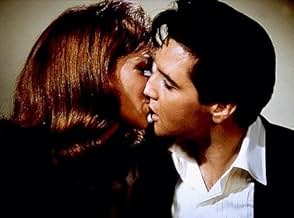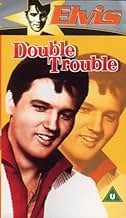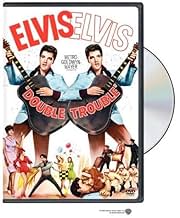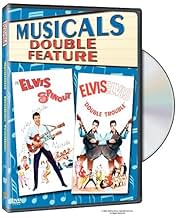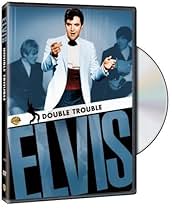NOTE IMDb
5,1/10
1,9 k
MA NOTE
Ajouter une intrigue dans votre langueWhen singer Guy Lambert goes on tour in Europe, he is pursued by two beautiful women, bumbling jewel thieves, and a mysterious killer.When singer Guy Lambert goes on tour in Europe, he is pursued by two beautiful women, bumbling jewel thieves, and a mysterious killer.When singer Guy Lambert goes on tour in Europe, he is pursued by two beautiful women, bumbling jewel thieves, and a mysterious killer.
- Réalisation
- Scénario
- Casting principal
Monte Landis
- Georgie
- (as Monty Landis)
The G Men
- Themselves
- (as The G Men)
Martin Abrahams
- Club Dancer
- (non crédité)
Don Ames
- Customs Officer
- (non crédité)
Avis à la une
This was actually a decent movie but not great. It was a step up from the movies that he had been recently doing.Elvis plays Guy Lambert touring Europe, which Elvis wanted to do in real life. Unfortunately Guy gets mixed up in a scandal, and he and his love interest are running for their lives. The only part that I didn't like was Elvis sining "Old MacDonald."
This story has a bit more going for it than your average elvis film! Most of the time, it was just girl trouble, which always seemed to revolve around the elvis. In this one, "guy" goes on tour in europe and gets caught up in jewel smuggling operation. But first he meets jill (annette day, who was SO much younger than he), who decides she's going to marry him. Even before they have kissed! For most of the movie, she's dressed up as a young school girl, just to make the story even stranger. The usual mix of catchy tunes (long legged girl) and a bunch of forgettable songs. He actually sings old macdonald, at one point. Some familiar faces: jill's uncle is john williams, who was also the chauffeur in sabrina. Leon askin (general burkhalter!) is in here as the inspector. Check out the wiere brothers in wikipedia dot org... they were an act in vaudeville, and made several film and tv appearances from 1930s to the 1960s. They are they coppers who bring guy in for questioning, and probably the best part of the film. The storyline is odd, the choice of musical numbers is odd, and there's just a strange chemistry between everyone. The first half is slow as molasses, but it does pick up about halfway through. It's just okay. Of course, elvis fans should watch it, for historical reasons. Directed by the usual director norman taurog.
Hear Elvis say "bikkies" (a kick for me, as one who grew up with that contraction of "biscuits," in America known as cookies), see Elvis lay his kenpo down on a bad guy who dies as a result, see Elvis drive a VW bug, witness Elvis smash windows, marvel at Elvis in a mustache and glasses mask, and watch him beat up a beautiful woman! Those are some of the highlights, anyway. In truth, this film is among my very least favorite of Elvis films, even judging by the somewhat unique standards of the '60s travelogue Technicolor musicals that became the standard by 1962. The formula had worn thin by 1965 ("Frankie And Johnnie," "Harum Scarum," "Paradise, Hawaiian Style"), to say the least, and -- other than some bright points in "Spinout" and the entirety of "Easy Come, Easy Go" (like "Double Trouble," shot in 1966...for some reason, I like that crazy film) -- nothing got better, in my opinion, until the formula changed radically with 1968's "Stay Away, Joe" and "Live A Little, Love A Little."
The period 1965-1967 was Elvis' nadir, in other words, though the May, 1966 Nashville sessions (that yielded the immaculate "How Great Thou Art" gospel album and a few stellar secular songs, including a definitive take on one of Bob Dylan's songs) and recently-surfaced home recordings from that period show all too well how phenomenal Elvis' talent was at the time, a contrast that would anger and frustrate anyone who cared about his place in American and world culture and history. But we have what we have, and the criminal waste of talent that to a great extent represented Elvis' film career during this time is undeniable but shouldn't necessarily result in us writing off the results out of hand for that reason alone. There are a few moments in this film that are good, and a few when Elvis seems to actually be engaged rather than bored with the whole proceedings and just sleepwalking through it to fulfill contractual obligations.
There're some great actors in supporting roles, too, like Leon Askin (General Burkhalter!), Chips Rafferty, John Williams, Norman Rossington (the only actor to appear in films with the Beatles and Elvis), and Michael Murphy. Annette Day is kind of lackluster in the lead female role. Yvonne Romain is much more like it. And the Wiere Brothers have always irritated the hell out of me in this film -- wish they were not in it, because they really stupid things up.
The songs are not the greatest even compared to other songs from Elvis movies of this time, but I do like the title track, "Long Legged Girl" (a tasty song, actually, written by Joy Byers, who usually contributed great songs even to otherwise not-so-great movies, such as "Let Yourself Go" in "Speedway"), and the jazzy "City By Night." "Could I Fall In Love" is a nice ballad, a duet of Elvis with Elvis, but the entire June, 1966 session for this movie suffered from sonic problems and I believe it's one that Elvis complained vociferously about. I also believe that Elvis walked out on recording "Old McDonald" before he'd produced an acceptable master take, being totally disgusted by the task, and the master was spliced from what the engineers had captured. Not his greatest recorded moment, anyway. And, darn it, it (and the rest of the soundtrack) was recorded on my second birthday.
IMDb mixes up the screen character credits for Chips Rafferty and Norman Rossington but, to be fair, so does the end title sequence in the film. Oops.
The period 1965-1967 was Elvis' nadir, in other words, though the May, 1966 Nashville sessions (that yielded the immaculate "How Great Thou Art" gospel album and a few stellar secular songs, including a definitive take on one of Bob Dylan's songs) and recently-surfaced home recordings from that period show all too well how phenomenal Elvis' talent was at the time, a contrast that would anger and frustrate anyone who cared about his place in American and world culture and history. But we have what we have, and the criminal waste of talent that to a great extent represented Elvis' film career during this time is undeniable but shouldn't necessarily result in us writing off the results out of hand for that reason alone. There are a few moments in this film that are good, and a few when Elvis seems to actually be engaged rather than bored with the whole proceedings and just sleepwalking through it to fulfill contractual obligations.
There're some great actors in supporting roles, too, like Leon Askin (General Burkhalter!), Chips Rafferty, John Williams, Norman Rossington (the only actor to appear in films with the Beatles and Elvis), and Michael Murphy. Annette Day is kind of lackluster in the lead female role. Yvonne Romain is much more like it. And the Wiere Brothers have always irritated the hell out of me in this film -- wish they were not in it, because they really stupid things up.
The songs are not the greatest even compared to other songs from Elvis movies of this time, but I do like the title track, "Long Legged Girl" (a tasty song, actually, written by Joy Byers, who usually contributed great songs even to otherwise not-so-great movies, such as "Let Yourself Go" in "Speedway"), and the jazzy "City By Night." "Could I Fall In Love" is a nice ballad, a duet of Elvis with Elvis, but the entire June, 1966 session for this movie suffered from sonic problems and I believe it's one that Elvis complained vociferously about. I also believe that Elvis walked out on recording "Old McDonald" before he'd produced an acceptable master take, being totally disgusted by the task, and the master was spliced from what the engineers had captured. Not his greatest recorded moment, anyway. And, darn it, it (and the rest of the soundtrack) was recorded on my second birthday.
IMDb mixes up the screen character credits for Chips Rafferty and Norman Rossington but, to be fair, so does the end title sequence in the film. Oops.
Amusing Elvis fare, in which E is stuck protecting a wealthy heiress (Day) from her greedy uncle (Williams) who wants her killed before her 18th birthday so it won't be discovered that he's been stealing from her inheritance. Of course, this same date also explains why Elvis is reluctant to hook up with the petite Brit, and enables the evil uncle to send bumbling Belgian cops on E's trail for kidnapping. Also, groupie Romain turns out to be after more than E's autograph -- she's in the employ of the uncle too! Elvis sings some pretty good songs, some pretty bad songs, and gets involved in some funny situations. He even kills a guy in a fight (well, actually, he does that in a lot of his movies).
Did frozen funds inspire this Anglicization of Presley? hmmmmm......
Did frozen funds inspire this Anglicization of Presley? hmmmmm......
We've seen Elvis as the racecar driver, millionare texan, boxer (kid galahad), convict, hillbilly (kissin' cousins), dumb hilbilly again (follow that dream) Now we see the Tourist Elvis singing his way through England (although it's really Belgium, I'm told.)
Elvis is actually at his best when he is glib and cynical. In those instances his acting is really quite good in a comical way. Sort of like the wisecracking Jim Rockford of Rockford Files. When he tries to get serious, in most of his films, he appears wooden and scripted. This is not a bad Elvis movie, mostly due to the funny antics of the bumbling detectives following him, and Elvis' more relaxed acting style.
The fact that he breaks out in a song at the drop of the hat in some of the corniest situations doesn't matter. After all, it is an ELVIS movie.
One thing that baffles me is the title. Why DOUBLE trouble? Did I miss something? OK I think i get it.. 2 different women causing him trouble?...
Elvis is actually at his best when he is glib and cynical. In those instances his acting is really quite good in a comical way. Sort of like the wisecracking Jim Rockford of Rockford Files. When he tries to get serious, in most of his films, he appears wooden and scripted. This is not a bad Elvis movie, mostly due to the funny antics of the bumbling detectives following him, and Elvis' more relaxed acting style.
The fact that he breaks out in a song at the drop of the hat in some of the corniest situations doesn't matter. After all, it is an ELVIS movie.
One thing that baffles me is the title. Why DOUBLE trouble? Did I miss something? OK I think i get it.. 2 different women causing him trouble?...
Le saviez-vous
- AnecdotesElvis Presley later said about the film: "I wasn't exactly a James Bond in this movie. But then, no one ever asked Sean Connery to sing a song while dodging bullets."
- GaffesIn the closing credits Norman Rossington and Chips Rafferty were credited with each others roles. Norman Rossington played Archie Brown and Chips Rafferty played Arthur Babcock contrary to what is listed.
- Citations
Claire Dunham: There isn't an ounce of sympathy in your eyes.
Guy Lambert: There isn't an ounce of sincerity in yours.
- ConnexionsEdited into Elvis on Tour (1972)
Meilleurs choix
Connectez-vous pour évaluer et suivre la liste de favoris afin de recevoir des recommandations personnalisées
- How long is Double Trouble?Alimenté par Alexa
Détails
- Date de sortie
- Pays d’origine
- Langue
- Aussi connu sous le nom de
- Double Trouble
- Lieux de tournage
- Damse Vaart-Zuid, Brugge, Sint-Kruis, Flanders, Belgique(Truck ride, Elvis leaving Bruges)
- Société de production
- Voir plus de crédits d'entreprise sur IMDbPro
Box-office
- Montant brut aux États-Unis et au Canada
- 3 488 000 $US
- Durée
- 1h 32min(92 min)
- Rapport de forme
- 2.35 : 1
Contribuer à cette page
Suggérer une modification ou ajouter du contenu manquant


